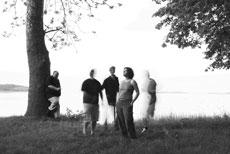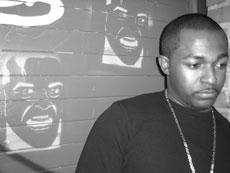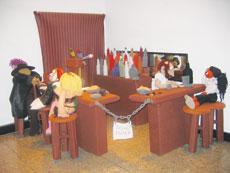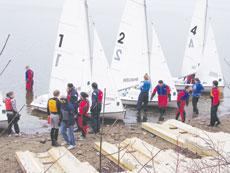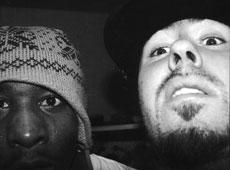Alternative Spring Break – Not Your Usual Trip to Cancun
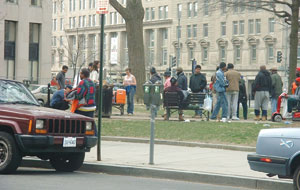
Addressing Homelessness One Spring Break At A Time
March 28, 2006
When UMass Boston student Porchea Tipton was packing for her vacation over spring break, she focused not on which set of open-toe flip flops would match which bathing suit and instead looked for some of her old t-shirts that she wouldn’t mind getting dirty. Unlike your average party-bound spring breaker, Tipton was preparing for some physical labor and an intense learning experience during the course of her March break.
That’s because Bell was a part of a group of ten UMass students who participated in this year’s alternative spring break, a program where students opt-out of the usual carefree fun-in-the-sun spring vacation to instead utilize their week of free time to do volunteer work assisting in programs aimed at addressing the homeless in Washington DC. This is the first program of its kind that UMass has been involved in over recent years and it was organized as a joint effort between two UMB organizations, MassPIRG and Jumpstart.
So what exactly is it that motivates students like Tipton to sacrifice a self-serving week in Cancun for a week of selfless community service? “I could go to Cancun anytime,” Tipton explains, “but how many chances do you have to make a difference in other people’s lives?”
Increasingly more student in campuses across the country are taking advantage of their spring time break from academic studies to participate in alternative spring break programs that continue to build upon their knowledge base. Participation has especially increased in the wake of recent national tragedies, like hurricane Katrina.
The ten UMass students and two advisors who went on the trip, spent just over a week in our nation’s capitol. Washington DC was chosen for a number of reasons, not the least of which was the nature of the homelessness problem in one of the most well known cities in the country. The extent of the issue stands in stark contrast to the suits, ties, and tourist attractions that exist just around the corner in this political hub. According to a 2005 report by the Institute for the Study of Homelessness and Poverty, Washington DC has a population of about 550,000, and of those citizens around 5,500 are homeless. These figures are comparable to the situation here in Boston, as both cities share 1% of their population being homeless. Following Detroit, MI and Orange County, CA, Boston and DC have one of the highest homelessness problems in the nation.
The connection between these two cities was not lost on the students, as UMB student Terese Leonard was quick to point out. “Because of the number of homeless in DC, there are also lots of available resources to try to deal with the problem. We thought that we could then bring some of that back here.”
Working and learning during the day, the students spent their nights in a local youth hostel which was a far cry from the comfortable hotel accommodates that many other spring-break bound students have come to expect. Thirty beds tightly lined the singly modestly sized room and only three showers were provided for the several dozen college students. As one would expect, this made sleeping arrangements quite taxing, but in the end many found that the experience was actually beneficial. Tipton was initially worried about the showers and bathrooms, but once she realized that they were staying in the same building that housed a woman’s shelter just above their own rooms, it almost made sense to be closer to the people that they would be working with.
“I think that I’ve always held some stereotypes about the homeless,” said Leonard. “But being involved in a program like this is a good chance to meet these people and to finally put a name to their faces.”
On the first day of the group’s arrival, they had just enough time in coming from the airport to drop off their belongings before they headed straight to the Greater Washington Food Bank to volunteer with preparing food packages that were to be received by local families. This helped them to become familiarized with some of the work that goes into one of the more immediate elements in addressing poverty: making sure the hungry are fed.
Later in the week they participated in work with Habitat For Humanity, physically putting up walls and nailing together the parts that would go into affordable housing. The construction was managed by several trained members of AmeriCorp-some of the UMass Boston students had very little experience with even using a hammer. The group also helped in cleaning up several local parks to make them safe for families and children.
But most everyone involved agreed that what left the most lasting impact was actually meeting members of Washington DC’s homeless community, which gave a human element to the work they were doing. On Monday, the students attended a panel of three speakers who were either homeless or formerly homeless. They informed students about their personal situations that lead them into homelessness. Later that day they went out to speak with some of local homeless individuals that populated the surrounding parks.
This process of approaching homeless citizens to discuss their issues and concerns was somewhat intimidating at first. Leonard explained, “I was concerned at first because we were spending a lot of time in these poor neighborhoods so I was nervous about safety, but when we got out there, it was amazing to see the community embrace us.” One of the people that they met that especially stood out to them was a man who they called Mr. Knockout who even the in eighty-five degree weather wore two large coats and carried around so many bags of personal possessions that it took him several trips to move his stuff in order for him to relocate. The man said that he was called Mr. Knockout because of how protective he was of his belongings. Interestingly, when he needed to go to a convenient store to purchase batteries for a small radio, it was a group of UMass students that he asked to keep an eye on his stuff.
“Most people were very open because they missed the communication. Because they were homeless, they had almost become invisible,” said Tipton.
On the last day of the their trip the students were invited to Capitol Hill to meet with one of Senator John Kerry’s legislative correspondents. They spoke with Meaghan Hohl about their experiences and what they had learned over the course of the week. She said that she congratulated the students and thanked them for their hard work ensuring them that she would later be speaking to the Senator about the students’ efforts.
Because of the success of this alternative spring break, many of the students are looking forward to planning more trips during school vacation time so they can further enrich their college learning experience while at the same time giving something back to the community. A May trip to New York is currently in the works and next year they hope to go to Miami.
To get more information about upcoming volunteer opportunities contact either Meghan Schumacher with Jumpstart Boston at [email protected] or Julie Heun with MassPirg at [email protected]





















































